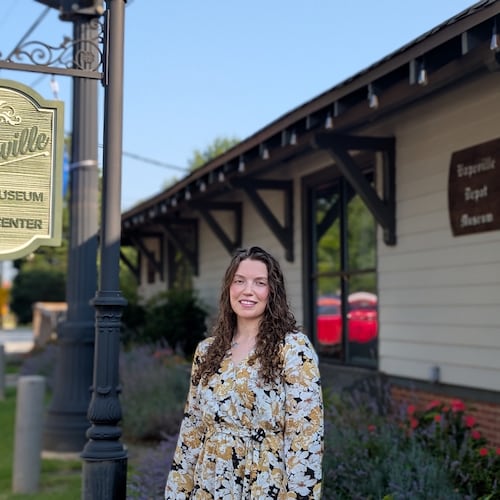Francine Wilkins knows that her sister, who died as an infant, is buried in Old Ebenezer Cemetery.
But she can’t find her.
Nor can she find any of her ancestors, buried in unmarked graves under the trees and overgrown brush in a patch of woods behind a fast food restaurant with a few broken tombstones scattered about.
Located near Shaw Park off of Canton Road in Cobb County, Old Ebenezer is a peaceful place for Wilkins. She sometimes talks to her ancestors among the trees. The cemetery has one standing tombstone, and is believed to be the final resting place of former slaves, including her great-great-grandfather, and their descendants after the Civil War.
But it is not the final resting place Wilkins envisions for them, and she hopes to restore and protect the cemetery.
“There are people buried here, and I want them to be remembered,” Wilkins said. “They lived. They had a presence. They’re my family.”
Wilkins is a member of Liberty Hill Missionary Baptist Church, just as her parents and grandparents were before her, and many of the church members also have family buried at Old Ebenezer. The church, founded by formerly enslaved people shortly after the end of the Civil War, started as a small log cabin and originally stood next to the cemetery, according to the church’s history.
Wilkins said she thinks the cemetery has existed since the 1830s and may have been a slave cemetery. The only records she can find, however, indicate that everyone buried there died after the Civil War. Church records were lost in a fire decades ago, and death certificates prior to the 1900s are hard to find if they exist at all.
“If it’s not on a headstone somewhere, they’re lost to time,” Wilkins said.
Her great-great-grandfather, Green F. Haley, is the oldest recorded person buried at Old Ebenezer, she said. He was born in 1842 and died in 1905.
His gravestone has been moved so many times that Wilkins does not know exactly where he is buried.
Credit: Ben Gray/AJC
Credit: Ben Gray/AJC
Wilkins’ church partnered with volunteers from the Church of Jesus Christ of Latter-day Saints a couple of years ago to start restoring the one-and-a-half-acre cemetery. But the massive undertaking will take some time, especially with little funds and a small group of volunteers. So far, they have cleared some of the brush, formed a path for people to walk through, and cleaned up most of the garbage and debris that had been tossed there.
“It’s unfortunate when a cemetery gets overgrown like this. They have stories to tell that we all should know, and that’s really important to us,” said Charlie Crose, a frequent volunteer at the cemetery.
Throughout time, white cemeteries have been typically better maintained and preserved in Cobb County and throughout the South. In a county-wide survey of cemeteries in the 1930s, the Black cemeteries were explicitly excluded, said Christa McCay, the collections manager for the Marietta History Center.
“Cemeteries like Old Ebenezer are just as important as white cemeteries. They need to be protected right now,” McCay said. “I think a lot of people didn’t even realize that cemetery was back there.”
Wilkins has records for 83 people buried at Old Ebenezer. Given the size and location of the cemetery, there could be over 100, some of which would have been born into slavery and later buried there, McCay said.
With very few records available and only a handful of tombstones left, Wilkins may never know the exact location of her ancestors or every person who is buried there. But she hopes to preserve what little is left by restoring the gravesites, building a fence, and making it more accessible for people to visit their loved ones.
“I don’t know how many of them were property owners, but they lived here, they worked here, they raised their families here,” Wilkins said. “They contributed, but I don’t see them being recognized.
“They deserve to be remembered.”
Credit: Ben Gray
Credit: Ben Gray
About the Author
Keep Reading
The Latest
Featured



